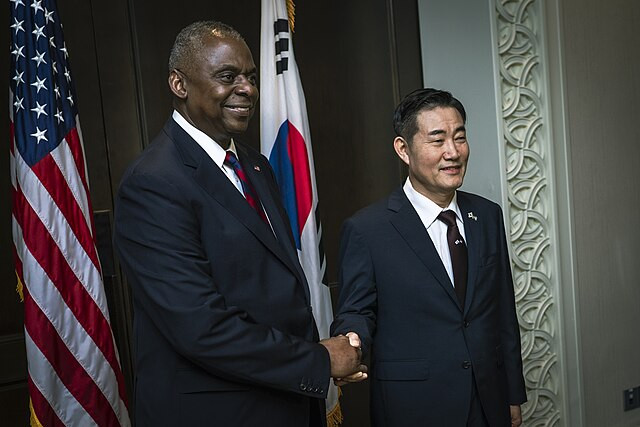South Korean Defense Minister Shin Won-sik issued a stark warning that any move by South Korea to develop its own nuclear weapons could severely damage its alliance with the United States and shock global financial markets. This comes amid increasing domestic calls for a nuclear arsenal to counter North Korea's expanding nuclear and missile capabilities.
As North Korea continues to bolster its nuclear arsenal, there has been a growing clamor within South Korea for the country to develop its own nuclear weapons. This sentiment has been amplified by members of President Yoon Suk Yeol's conservative ruling party. The prospect of former U.S. President Donald Trump returning to office-who previously questioned the cost of U.S. military presence in South Korea and engaged in unprecedented talks with Pyongyang-has further fueled this debate.
However, Minister Shin, a former three-star army general, strongly opposed the idea, citing dire consequences. "You'll face a huge crack in the U.S. alliance, and if we withdraw from the nuclear non-proliferation treaty, it would bring various penalties, starting with an immediate shock in our financial market," Shin said in an interview with Reuters. He likened the potential economic fallout to Black Monday, referring to the stock market crash in 2008.
Shin acknowledged that the ongoing debate reflects the anxiety among South Koreans about American extended deterrence, particularly its nuclear capabilities. Despite this, he maintained that the U.S.-South Korean push to strengthen deterrence remains the "easiest, most effective, and peaceful" method to counter North Korea's threats.
The intensifying strategic rivalry between the United States and China, coupled with the ongoing Ukraine war, has created a significant paradigm shift, positioning South Korea at the heart of this geopolitical turmoil. "Even in Northeast Asia, there are forces who are openly seeking to change the status quo by force, and we are at the forefront, directly affected," Shin noted.
North Korea's strategic partnership with Russia this year has transformed it from a regional headache to a global villain, Shin said. He criticized Moscow for seeking help from Pyongyang, undermining its own prestige and betraying the international community with its aggression in Ukraine. South Korea has responded by hinting at the possibility of arming Ukraine, a significant shift from its policy of providing only humanitarian and economic assistance, if Russia supplies North Korea with advanced weapons technology.
Shin revealed that North Korea received Russian assistance for a rocket engine used in a failed attempt to launch a spy satellite in May. While he did not consider this a breach of a "red line," he expressed greater concern over the transfer of technology related to intercontinental ballistic missiles, nuclear weapons, and advanced military hardware.
From the beginning of last year until August 4, North Korea shipped over 12,000 containers to Russia, enough to carry approximately 5.6 million 152-mm artillery shells, Shin disclosed. These shipments included various types of shells and dozens of short-range missiles.
While President Yoon's administration has been more vocal in echoing Washington's calls for "like-minded nations" to stand united against China and Russia, Shin clarified that South Korea has not discussed joining other U.S. allies in naval exercises in the South China Sea, a region marked by maritime disputes with China.
Recent tensions between North and South Korea have escalated, particularly after North Korea floated thousands of balloons containing trash in protest against South Korean activists sending anti-Pyongyang leaflets. In response, Seoul resumed loudspeaker broadcasts near the border for the first time since 2018, blaring news and K-pop music. Shin described this as an "effective, stinging" form of psychological warfare.
Among the broadcasts was news of the defection of Ri Il Gyu, a senior North Korean diplomat based in Cuba, and the participation of Jin, a member of the K-pop group BTS, in the Paris Olympics' torch relay. "I understand that North Korea has been struggling to block BTS' popularity as there was a craze among young people imitating their dances," Shin said.
Shin emphasized that the loudspeaker campaign could have a long-term impact and potentially drive societal change in North Korea, contributing to denuclearization efforts if supported by the international community.






